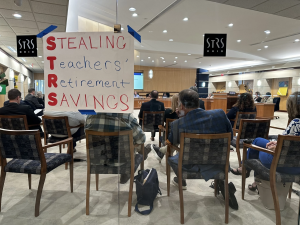News
Upheaval at Ohio teachers’ pension fund continues with lawsuit, removal of board chair
By: Karen Kasler | Statehouse News Bureau
Posted on:
COLUMBUS, Ohio (Statehouse News Bureau) — Turmoil at the $90 billion teachers’ state pension fund has gone from the meeting room to the courtroom and back.

It’s the latest in a saga that goes back years, as retired teachers have fought the STRS board to reinstate an annual cost of living adjustment (COLA), and to be more transparent about the fund’s investments, fees and staff bonuses.
Yost sued to remove Wade Steen and Rudy Fichtenbaum. In his lawsuit, Yost alleges they “seek to steer as much as 70% of STRS’s current assets (about $65 billion in teacher pension funds) to a shell company that lacks any indicia of legitimacy and has backdoor ties to Steen and Fichtenbaum themselves.”
State of Ohio v. Steen et al. – Complaint.pdf
The lawsuit comes almost a week after Yost said he was investigating concerns about STRS’s “susceptibility to a hostile takeover by private interests.” Yost and other state officials received an anonymous letter suggesting Steen and Fichtenbaum are working with QED, a private investment company. It’s believed the letter was prepared by STRS staffers.
“He’s hiding behind litigation. It’s defamatory. It’s not true,” Steen told reporters during a break in the STRS monthly board meeting, which began a few hours after Yost filed the lawsuit. “I thought there was going to be a fair, impartial investigation. I guess this might be the fastest investigation ever done in Ohio history. But we’re going to defend this vigorously.”
Steen denied involvement with QED and said he wants index funding and transparency, and that that those who want him removed have “a vested interest in getting bonuses.”
Steen was appointed to the STRS board as an investment expert in 2016 by then-Gov. John Kasich, and was reappointed by Gov. Mike DeWine in 2020. Steen and some elected board members backed by retired teachers aligned on calls for more transparency of the pension fund. Last summer DeWine removed Steen for missing meetings. Steen denied that and won a lawsuit to get his seat back.
STRS board members backed by retired teachers have the majority after an election this weekend. At Wednesday’s meeting, they voted to remove the current board chair and put the other person named in Yost’s lawsuit, Rudy Fichtenbaum, in charge. Fichtenbaum was elected to the board in 2021.
“That says that the majority of the members of the board believe that I have carried out my fiduciary responsibilities and they have confidence that I will continue to do that,” Fichtenbaum told reporters.
Yost’s spokesperson said in an emailed statement: “We have reason to believe, based on the information presented in the allegation documents and the preliminary investigation, that certain STRS board members acted inappropriately and disregarded their fiduciary responsibilities. The investigation is ongoing. This lawsuit allows us to obtain the discovery documents necessary to finding answers to the allegations. This is a step in the process to ensure that we continue to fight to protect teachers’ hard earned retirement dollars.”
Retired teachers didn’t receive a cost of living raise for five years. They’ve pressured the board for information on its investments. In 2022, they hired forensic investigator Ted Siedle, who produced a report that blasted STRS for a lack of transparency, high fees and underperforming investments. STRS fired back by saying the report contained “numerous misstatements and allegations not supported by evidence.”
In 2022, STRS announced it had lost $3 billion in the past year, or about 3%. STRS said investment managers made good choices in a weak market, and the board voted to pay nearly $10 million in what it called “performance incentives” to around 90 of them.
Meanwhile, the executive director of STRS was suspended in November after staffers accused him of violent behavior and sexual harassment. Fichtenbaum said the situation involving Bill Neville might be discussed at the board’s meeting next month.

